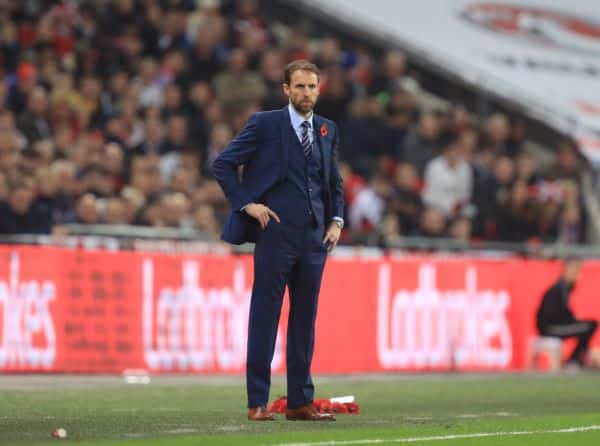Gareth Southgate knows beating Scotland got him the permanent gig as England manager – an opportunity he had regretted not pushing for sooner.
The Three Lions welcome Steve Clarke’s side to Wembley on Friday looking to seal progress to the round of 16 with a game to spare.
The 115th instalment of international football’s oldest rivalry will be the fifth Southgate has played or managed in, having started in the fixture twice and then managed two World Cup qualifiers.
The Paul Gascoigne-inspired 2-0 win at Euro 96 is the most memorable of those matches, but the 3-0 qualifying win against Scotland in November 2016 arguably had the biggest impact on the 50-year-old.
England Under-21s manager Southgate was parachuted in as temporary boss following Sam Allardyce’s ignominious exit and had overseen a 2-0 win against Malta and 0-0 draw in Slovenia before beating Scotland.
Asked if he would have been England boss had that 3-0 win not happened, he said: “I think it’s a really good point. I suspect if we hadn’t beaten Scotland, you’re right – you wouldn’t be speaking to me here.
“Also, I think that moment for Scotland was a difficult one. They were in the middle of a bad run of form and that fell quite kindly for us as a fixture.

“I felt we played well on the night but we were in the really early stages of getting the team playing in a way that resembled what we truly believed and what the consequence of more time coaching the team allowed to happen.”
Southgate secured a 2-2 friendly draw against Spain days after that win, with his four-game interim stint enough to be earn him a four-year deal.
The former defender had initially been reluctant to take the job when Roy Hodgson left after the Euro 2016 humiliation against Iceland but jumped at the chance when it came back up.
“I think what persuaded me was that I felt the players were willing to adapt to the approach that we had, to embrace the way we wanted to play and the way we wanted to work,” Southgate said.

“I think the win just allowed that to happen, really. It wasn’t the win that convinced me.
“It was the win that perhaps had other people say, ‘well, blimey, we’ve tried everything else, so we might as well give this bloke a go – he took the under-21s and go from there!’
“But on a personal level it was the case I knew by the time I got to that game it was a role I felt I wanted, even though I was never going to say that publicly.
“I knew at that point having worked with the players and having had a closer insight into the workings of the job it was something I wanted to go for in my life.
“I had kind of regretted by that point not having a go at it and would have never known what might have been possible and that’s not a good position to be in in your life.
“I think when we saw what happened with Christian Eriksen the other day (with his cardiac arrest) it’s just another reminder that you have got to go for things in life and give them the best possible shot.
“Then when you’re finished, at least you don’t have regrets for things that you didn’t have a go at or performances that were inhibited. We’ve got to go for it.”
If that first fixture against Scotland got him the England job, the second game helped shape it as the group showed immense character to snatch a 2-2 draw at the death in Glasgow.
“We learned a lot,” Southgate said of the June 2017 meeting. “I think for this team it was a moment where they didn’t panic when they went behind and that was very important.
“We felt like that had happened in the past. They showed themselves that they could come back from difficult situations in games and we’ve been able to do that in the past few years. That’s a strength.
“I think good teams win games late. They are capable of coming back from setbacks.
“It also taught me that sometimes you can go with experienced players and expect them to be able to handle those sorts of games – and actually it doesn’t always work out that way.
“So, you know, it’s probably one of the moments when I started to think about younger players coming in, who were a little bit more fearless perhaps and going a slightly different route.
“The atmosphere was as good as I’ve been involved in, there’s no doubt about that. But it was definitely, aside from that, an afternoon that taught us a lot.”





